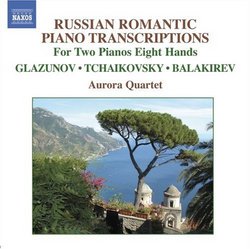| All Artists: Glazunov, Tchaikovsky, Balakirev, Aurora Quart Title: Russian Romantic Piano Transcription (Ltd) Members Wishing: 0 Total Copies: 0 Label: Naxos Release Date: 7/13/2006 Album Type: Limited Edition Genre: Classical Styles: Chamber Music, Historical Periods, Classical (c.1770-1830) Number of Discs: 1 SwapaCD Credits: 1 UPC: 747313271726 |
Search - Glazunov, Tchaikovsky, Balakirev :: Russian Romantic Piano Transcription (Ltd)
 | Glazunov, Tchaikovsky, Balakirev Russian Romantic Piano Transcription (Ltd) Genre: Classical |
Larger Image |
CD Details |
CD ReviewsOne of the best Naxos releases in years Hexameron | 01/18/2007 (5 out of 5 stars) "I am in complete awe at the astonishing quality and fascinating works featured on this recording. With the exception of the Tchaikovsky Capriccio italien, I have not heard the Glazunov and Balakirev symphonic poems in their orchestral form. Nonetheless, the powerful and superb Aurora Quartet eloquently interprets these works with skill and feeling. These mammoth pieces, many of them virtuosic, dramatic and highly melodic, are all masterpieces. Naxos and the Aurora Quartet have given us no less than 4 masterworks played with intensity, orchestral timbres, and the utmost supreme musical feeling I ever imagined in an eight hand performance. Sadly, this disc is a "Limited Edition." Indeed, I did not get mine from Amazon and I happened to receive the German import version of this recording (CD pamphlet still had an English translation). Regardless, this is a breathtaking recording that showcases not only some engrossing music, but also the versatility and awesome power of two pianos. Tchaikovsky's Capriccio Italien is wonderfully transcribed. The tempo and mood is exemplary and even enhanced by the dynamics of the piano. At once serious and then comically rhythmic, like Rossini's William Tell overture, it sparkles with brilliant runs and rapid passages. It's difficult to distinguish eight hands here since the textures are somewhat simple. I feel, though, that four enraptured pianists only improve the bravura and rhythmic excitement of the piece. The two Glazunov symphonic poems are marvelous and immense creations of music. I cannot fathom their neglect, but they are surely some of the best symphonic poems I've heard after Liszt. Again, two pianos are essentially indomitable here. The Forest is a dark and highly Romantic work of gigantic proportions. It is bursting with drama, relentless energy, and absolutely phenomenal melodies and harmonies. The opening of The Forest reaches wondrous tone-colors with a dark main theme that contrasts with magical harp-like arpeggios. This opening and the many moments that follow are quite chilling. These four pianists play with increasing gusto and propulsion throughout. You can instantly recognize their reverence of this music: no bar is played without the appropriate emotion and deepest thought. Fear, apprehension, gloom, foreboding, magic, life, and relief are just some of the words I can use to describe this. Glazunov has won me over here, this being the first work I've heard from him. Amazingly, The Sea reaches even loftier heights in my view. This is surely one of the greatest evocations of the sea, after Mendelssohn and Debussy. Perhaps more than the orchestra, the tremolos and octaves in the lower registers of the piano effectively create a sense of large waves roaring in the midst of a storming sea. Indeed, the piano interprets the violence of the sea with hair-raising results. The calm of the sea is also represented beautifully in the serene moments. Glazunov does not sacrifice the beautiful harmonies for pictorial effects either. The music is perfectly independent of the programme. But visualizing the programme certainly does no harm: "Bright sun shone in the sky, the sea was calm, suddenly a raging whistling gust of wind arose, followed by another. The sky grew dark, the sea became agitated. The elements launched into a struggle, relentless, with great roaring. A violent storm burst. But the tempest passed away, the sea became calm again. The sun shone anew over the calm surface of the water." The music illustrates this remarkably well. The pianists are possessed with the rage of the waves, the tranquil surface of the water, and the entire atmosphere of the sea. The Sea demands a colossal virtuosity and these pianists deliver. Balakirev is slipping more and more into obscurity; not even his Islamey seems to sustain him. I scratch my head at this, though, when I have a chance to hear the rich melodies and the grim expressions of this titanic 18 minute work, Tamara. This tone-poem seems to me a worthy composition with impressive effects, tone-colors, and above all, haunting music. The opening bars are so dark they're indeed frightening. Furthermore, these pianists are so convincing in their dynamics and emotional rendering of the phrases. Sinister darkness, ghostly echoes, tender angelic moments, and tempestuous dances are all explored and emphasized by this quartet. Tamara was dedicated to an approving Franz Liszt, and I could think of no better dedicatee for this illustrious piece. Bottom line: These works are brimming with Russian and German Romanticism. Having not heard the orchestral versions, I cannot compare the two piano versions. But the two pianos have most triumphantly captured the gorgeous harmonies and deep sonorities of the music material. I haven't heard really good music like this in a while. Pianophiles and lovers of the Romantic period are implored to discover for themselves the wealth of music here. The disc is a "Limited Edition," so get it while you can." Russian Piano Transcriptions D. I. Barrett | United Kingdom | 09/24/2008 (4 out of 5 stars) "This is a thoroughly recommended disc. The performance is crisp bright and sensitively played by all four pianists and the recording quality is admirable throughout.It is a real delight to hear these works by Tchaikovsky, Balakirev and Glazunov in their piano transcriptions. Naxos are to be commended for their enterprise; may we have more from 'Aurora' in due course."
|
